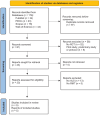Efficacy of respiratory muscle training in improving pulmonary function and survival in patients with amyotrophic lateral sclerosis: a systematic review and meta-analysis
- PMID: 40488544
- PMCID: PMC12149620
- DOI: 10.1177/17534666251346095
Efficacy of respiratory muscle training in improving pulmonary function and survival in patients with amyotrophic lateral sclerosis: a systematic review and meta-analysis
Abstract
Background: Amyotrophic lateral sclerosis (ALS) is a progressive neurodegenerative disease that affects motor neurons, resulting in muscle weakness, loss of function, and ultimately death due to respiratory failure. Due to the lethal prognosis of ALS, respiratory muscle training has been proposed as a potentially beneficial intervention.
Objectives: To systematically review the efficacy of respiratory muscle training on lung function and respiratory muscle strength in ALS patients.
Design: A systematic review and meta-analysis of randomized controlled trials.
Data sources and methods: Articles published in PubMed, PEDro, Scopus, and Web of Science databases up to July 2024. The Preferred Reporting Items for Systematic reviews and Meta-Analyses 2020 statement guideline was followed. Included studies had (1) ALS patients, (2) respiratory muscle training, (3) physical exercise, usual care or no intervention were provided as a comparison group, (4) assessments of lung function, respiratory muscle strength, quality of life, survival, fatigue, and functional capacity outcome measures, and (5) a randomized controlled trial design. Methodological quality was analyzed using the PEDro scale, and risk of bias with the Cochrane Collaboration Risk of Bias Tool. Meta-analyses were performed with Review Manager software.
Results: Five randomized controlled trials with 170 participants were included. The results showed that respiratory muscle training improved muscle strength, particularly maximum expiratory and inspiratory pressures. One study suggested inspiratory muscle training as a survival predictor in ALS patients. No significant effects were observed in forced vital capacity or quality of life. No adverse effects were reported.
Conclusion: Respiratory muscle training improves ventilatory function, particularly respiratory muscle strength, in people with ALS. While evidence is limited, it shows promise as an adjuvant therapy to enhance quality of life and survival. It has been registered in the PROSPERO (CRD42024568235).
Keywords: amyotrophic lateral sclerosis; inspiratory muscle strength; neuromuscular disease; physiotherapy; rare disease; respiratory failure.
Figures





Similar articles
-
Respiratory muscle training for multiple sclerosis.Cochrane Database Syst Rev. 2017 Dec 21;12(12):CD009424. doi: 10.1002/14651858.CD009424.pub2. Cochrane Database Syst Rev. 2017. PMID: 29267988 Free PMC article.
-
Physical exercise training interventions for children and young adults during and after treatment for childhood cancer.Cochrane Database Syst Rev. 2016 Mar 31;3(3):CD008796. doi: 10.1002/14651858.CD008796.pub3. Cochrane Database Syst Rev. 2016. PMID: 27030386 Free PMC article.
-
Symptomatic treatments for amyotrophic lateral sclerosis/motor neuron disease.Cochrane Database Syst Rev. 2017 Jan 10;1(1):CD011776. doi: 10.1002/14651858.CD011776.pub2. Cochrane Database Syst Rev. 2017. PMID: 28072907 Free PMC article.
-
Mechanical ventilation for amyotrophic lateral sclerosis/motor neuron disease.Cochrane Database Syst Rev. 2017 Oct 6;10(10):CD004427. doi: 10.1002/14651858.CD004427.pub4. Cochrane Database Syst Rev. 2017. PMID: 28982219 Free PMC article.
-
Inspiratory muscle training, with or without concomitant pulmonary rehabilitation, for chronic obstructive pulmonary disease (COPD).Cochrane Database Syst Rev. 2023 Jan 6;1(1):CD013778. doi: 10.1002/14651858.CD013778.pub2. Cochrane Database Syst Rev. 2023. PMID: 36606682 Free PMC article.
References
-
- Ashworth NL, Satkunam LE, Deforge D. Treatment for spasticity in amyotrophic lateral sclerosis/motor neuron disease. Cochrane Database Syst Rev 2012; (2): CD004156, https://www.cochranelibrary.com/cdsr/doi/10.1002/14651858.CD004156.pub4/... (2012, accessed 30 June 2024). - DOI - PMC - PubMed
Publication types
MeSH terms
LinkOut - more resources
Full Text Sources
Medical
Miscellaneous

